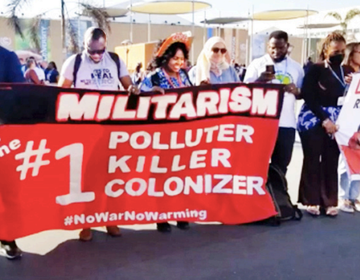
By Cindy Piester
In November 2022, I headed out to COP 27 in Sharm el Sheikh, Egypt, as an NGO delegate with the Women’s International League for Peace and Freedom (WILPF). I hoped to move forward the conversation on the need for the United Nations to count all emissions, including military emissions, so that we might limit warming to the 1.5 C (2.7 F) rise above pre-industrial times by this century’s end.
Our military is the world’s largest institutional user of fossil fuels and the world’s largest institutional producer of greenhouse gas (GHG) emissions. Yet, thanks to the US government, these emissions have flown under the radar since the Kyoto Accords in 1997. Globally, military emissions are 5% of total annual emissions, yet reporting them remains optional, and the United Nations Framework Convention on Climate Change (UNFCCC) protocols serve to intentionally obscure any military emissions reported, by mixing them in with civilian emissions.
COP 27’s opening day was also the annual International Day for Preventing the Exploitation of the Environment in War and Armed Conflict. Coinciding with that, WILPF partnered with the International Peace Bureau (IPB) and World BEYOND War (WBW) to release two bold letters. One called for, while the other requested, that the UNFCCC add the impacts of military emissions and military expenditures on climate to its 2023 agenda.
Our days began with informative and inspirational gatherings of feminists at the well-attended Women and Gender Constituency (WGC) meetings, where we mixed and mingled with women leaders from around the world. At times, the young feminists took the stage with rousing sing-alongs and demands to demilitarize, denuclearize, decarbonize, decolonialize, and defund militaries. Inevitably, these concerns were also included in WGC’s negotiations and reports.
We must understanding how quickly the planet and oceans are warming and how devastating the impacts — among them, droughts, desertification, fires, ice melt, rising sea levels, ocean acidification, catastrophic storms, hurricanes, flooding, and loss of keystone species and biodiversity — are to life on the planet. Clearly all emissions, including military emissions, must be counted and reported. So, when the US State Department called an informal meeting with all US delegates at COP 27, I raised the issue that, because of pressure from the US government, military emissions were exempted from mandatory UNFCCC reporting. These emissions and their reduction targets need to be included in our Nationally Determined Contributions (NDC) consistent with GHG emissions protocols.
Among other questionable reporting mechanisms: emissions from hundreds of US overseas military bases are charged to host nations rather than to the United States; emissions from overseas transport associated with military supply lines are not charged to the US Department of Defense (DoD), but reported separately as “bunker fuels;” and war-related emissions are ignored entirely. The US State Department noted these issues as concerns, and moved on. Many US delegates, however, paid careful attention. Axel Michaelowa, senior founding partner of the Perspectives Climate Group, called for solutions that included reporting military and conflict-related emissions in the Global Stocktake — a long, hard look at the state of our planet, Stocktake charts a better course for the future, and for COP 28, held in Dubai, November 30 – December 12, 2023.
Our Department of Defense with its unsustainable annual budgetary allotment and global emissions is a disaster for our country and for the world. We seriously need to rethink our national security as we speed past climate tipping points dooming our youth to triple nightmares of out-of-control climate change, unbearable debt, and permanent war.
Cindy Piester participates in the alternative media, documents US war crimes, and stands with VFP, WILPF, the Unitarians, Code Pink and justice lovers everywhere.
graphic: Women's International League for Peace and Freedom

 RSS Feed
RSS Feed
